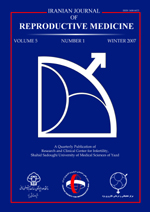
|
International Journal of Reproductive BioMedicine
Research and Clinical Center for Infertility, Shahid Sadoughi University of Medical Sciences of Yazd
ISSN: 1680-6433
EISSN: 1680-6433
Vol. 17, No. 6, 2019, pp. 443-448
|
 Bioline Code: rm19047
Bioline Code: rm19047
Full paper language: English
Document type: Research Article
Document available free of charge
|
|
|
International Journal of Reproductive BioMedicine, Vol. 17, No. 6, 2019, pp. 443-448
| en |
Effects of autologous platelet-rich plasma on endometrial expansion in patients undergoing frozen-thawed embryo transfer: A double-blind RCT
Nazari, Leila; Salehpour, Saghar; Hoseini, Sedighe; Zadehmodarres, Shahrzad & Azargashb, Eznoallah
Abstract
Background: Adequate endometrial growth is principal for implantation and pregnancy.
Thin endometrium is associated with lower pregnancy rate in assisted
reproductive technology. Some frozen-thawed embryo transfer cycles are cancelled
due to inadequate endometrial growth.
Objective: To assess the effectiveness of autologous platelet-rich plasma (PRP)
intrauterine infusion for the treatment of thin endometrium.
Materials and Methods: A total of 72 patients who had a history of cancelled frozen-thawed
embryo transfer cycle due to the thin endometrium (< 7mm) were assessed for
the eligibility to enter the study between 2016 and 2017. Twelve patients were excluded
for different reasons, and 60 included patients were randomly assigned to PRP or
sham-catheter groups in a double-blind manner. Hormone replacement therapy was
administered for endometrial preparation in all participants. PRP intrauterine infusion
or shamcatheter was performed on day 11-12 due to the thin endometrium and it was
repeated after 48 hr if necessary.
Results: Endometrial thickness increased at 48 hr after the first intervention in both
groups. All participants needed second intervention due to an inadequate endometrial
expansion. After second intervention, endometrial thickness was 7.21 ± 0.18 and 5.76
± 0.97 mm in the PRP group and sham-catheter group, respectively. There was a
significant difference between the two groups. (p < 0.001). Embryo transfer was done
for all patients in PRP group and just in six cases in the sham-catheter group. Chemical
pregnancy was reported in twelve cases in the PRP group and two cases in the sham-catheter
group.
Conclusion: According to this trial, PRP was effective in endometrial expansion in
patients with refractory thin endometrium.
Keywords
Platelet-rich plasma; Endometrium; Embryo transfer; Randomized controlled trial.
|
| |
© Copyright 2019 - Leila Nazari et al.
Alternative site location: http://www.ijrm.ir
|
|
